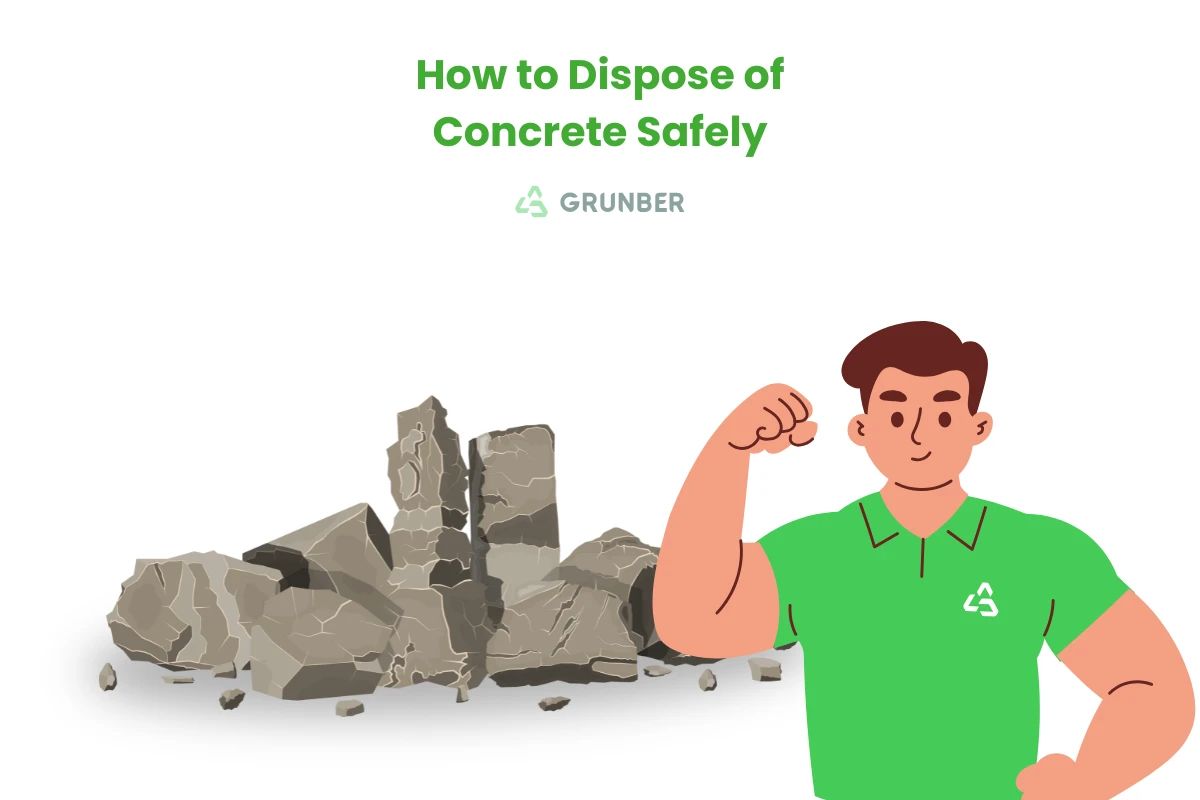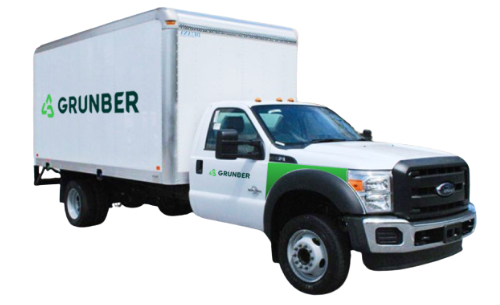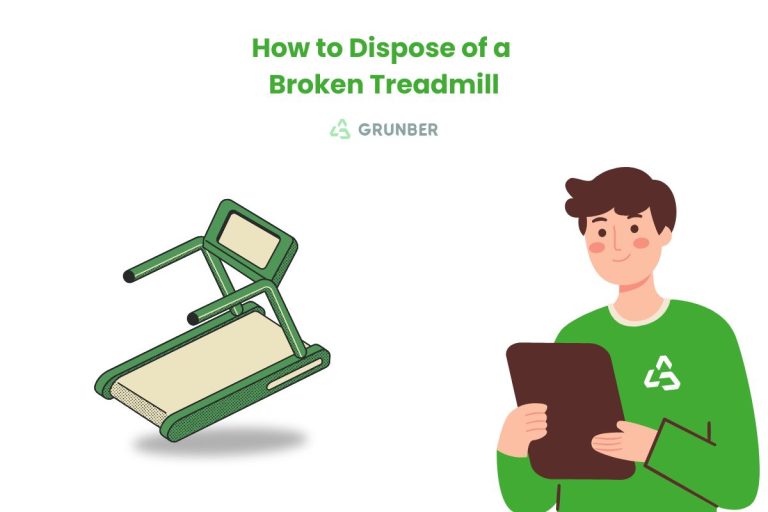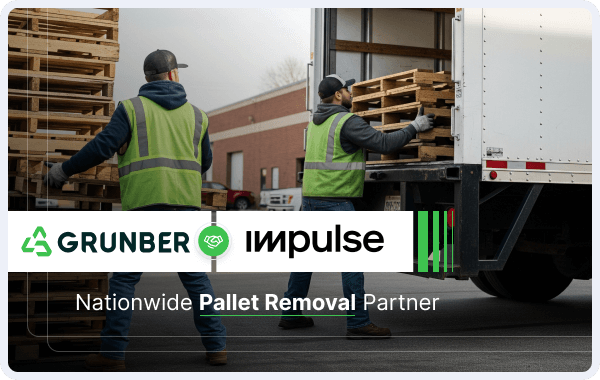Disposing of concrete might seem like a heavy task, but with the right approach, it can be straightforward and environmentally responsible. Whether you are tackling a home renovation, a demolition project, or simply clearing out old materials, understanding your options is key to a smooth process.
At Grunber, we believe that clearing out clutter, including heavy construction debris like concrete, can and should be both convenient and environmentally responsible. We aim to simplify the entire process, allowing you to focus on what matters most: enjoying a cleaner, more sustainable space. This guide will walk you through the best methods for concrete disposal, emphasizing sustainable practices, and highlighting how our services can make the process effortless for you.
The Importance of Proper Concrete Disposal
Concrete is a durable and widely used material, but when it is removed, it becomes heavy and unwieldy waste. Improper disposal can significantly harm the environment. For instance, concrete manufacturing and waste contribute to the world’s CO2 emissions, and landfill decomposition releases methane, a greenhouse gas. A substantial amount of construction and demolition (C&D) debris, including concrete, ends up in landfills, reducing valuable airspace and depleting natural resources like sand and gravel.
Proper recycling and disposal, however, can mitigate these environmental impacts and offer numerous benefits. Recycling concrete helps to preserve natural resources, reduces landfill waste, and can even provide cheaper aggregate building materials for new projects. It is a crucial step towards sustainable construction.
Methods for Concrete Disposal
When it comes to getting rid of concrete, you have several options. The best choice often depends on the amount of concrete you have, your budget, and whether you prefer to handle the heavy lifting yourself or rely on professionals.
Hiring a Professional Junk Removal Company
For a fast, easy, and hassle-free solution, hiring a junk removal company like Grunber is often the best option. Our expert team handles the heavy lifting for you, working on your schedule. We specialize in comprehensive junk removal and bulky waste solutions, including construction debris like concrete, cement, and asphalt.
Grunber connects you with trusted local drivers who are fully trained and insured, ensuring a stress-free experience. You do not need to be on-site for delivery or pickup with a dumpster rental, but with a full-service junk removal company, you will usually need to be present for the pickup. However, the benefit is that our team loads up your debris and takes it away, saving you significant time and effort. This method is especially ideal for larger projects where manual labor is a concern.
Recycling or Reusing Concrete Yourself
Recycling concrete is an excellent way to reduce waste and contribute to a greener environment. Specialized facilities across the country can process and repurpose concrete. This usually involves grinding down the material and removing imperfections to create new concrete or other useful products.
The concrete recycling process typically involves collecting the material, then running it through a crusher to reduce it to smaller pieces. Magnets are often used to remove ferrous and non-ferrous metals, such as rebar, for separate recycling. The material is then screened and sorted into various sizes for different applications, such as road base, pea gravel, or aggregate for new concrete mixes. Clean concrete, free of contaminants like paint or hazardous materials, is generally preferred for recycling.
Beyond professional recycling, you can also repurpose concrete for various projects. Many landscaping companies actively seek old concrete for hardscaping elements like garden borders, pathways, and retaining walls. If you are a DIY enthusiast, you can reuse concrete chunks or slabs for new construction, pathways, or even decorative elements in your own landscaping. Concrete mix can be used for setting posts or creating new blocks before it dries.
Renting a Roll-Off Dumpster
Renting a roll-off dumpster is a common and quick way to dispose of concrete, cement, and other construction materials, especially for large amounts. These dumpsters can typically handle a significant volume of waste, allowing you to work at your own pace and toss everything at once. A 10-yard container is often recommended for concrete and other heavy materials.
Dumpster rental offers an upfront cost and guaranteed pickup. However, sizes and weight limits can vary by location. While this method provides convenience, it still requires you to do the heavy lifting and loading of materials into the container. You must also ensure the dumpster is placed in an appropriate location, and you may need to check local regulations or permits for dumpster placement. For large quantities, dumpsters can be more cost-effective than multiple junk hauler trips.
Taking Concrete to a Landfill or Transfer Station
If you have the means for transportation, you can dispose of concrete yourself by driving it to the nearest landfill or transfer station. This option allows you to work at your own pace. Before making the trip, it is crucial to contact the facility beforehand to confirm they accept concrete and to inquire about any associated fees. Concrete disposal costs at landfills typically range from $51 to $100 per ton. Some county landfills may even offer free dump days a few times a year for residents.
While a guaranteed disposal option, it requires access to a truck or other suitable vehicle, and you will be responsible for all the heavy lifting and transportation. For large amounts, you may need to make multiple trips, which can add to the overall time and cost (including gas and vehicle rental, if applicable).
Planning and Safety for Concrete Disposal
Regardless of the method you choose, careful planning and prioritizing safety are essential for proper concrete disposal.
First, assess the type and quantity of concrete you need to dispose of. This will help you determine the most appropriate removal method and estimated costs. Next, investigate local laws and regulations governing concrete disposal in your area and obtain any necessary permits.
When handling concrete, always prioritize safety. Wear appropriate personal protective equipment, including gloves, safety glasses, and sturdy footwear. Clear your work area of any potential hazards, and use suitable tools like jackhammers, chisels, or concrete saws to break up the concrete into manageable chunks (around 60-90 cm) if needed. Breaking down large pieces makes handling and transportation easier.
It is also important to classify different types of debris by material and avoid mixing construction waste with general garbage. Establish a designated area to store the concrete waste until it is ready for disposal.
Choose Grunber for Effortless Concrete Disposal
Disposing of concrete responsibly is essential for minimizing waste and conserving natural resources. While there are various options, choosing a professional service that aligns with your needs for efficiency and sustainability can make a significant difference.
At Grunber, we are dedicated to making the junk removal process effortless and responsible for everyone. We offer fast, efficient pickups at competitive rates, all while prioritizing sustainability by recycling, repurposing, or donating materials whenever possible. Our nationwide service connects you with trusted local drivers, ensuring reliable and professional service for construction debris removal, including all types of concrete.
Let our fully insured and well-trained team take care of the heavy lifting and responsible disposal of your unwanted concrete. You can trust Grunber to achieve a clutter-free, safer, and more sustainable space.
Ready to get rid of your old concrete? Contact Grunber today for a fast, hassle-free experience that prioritizes eco-friendly solutions.











